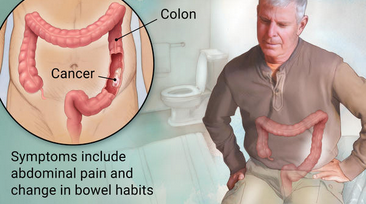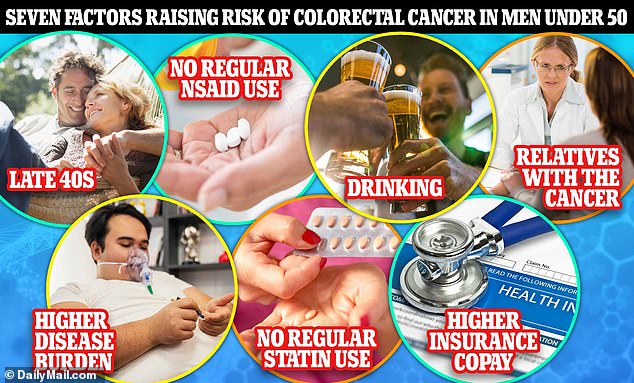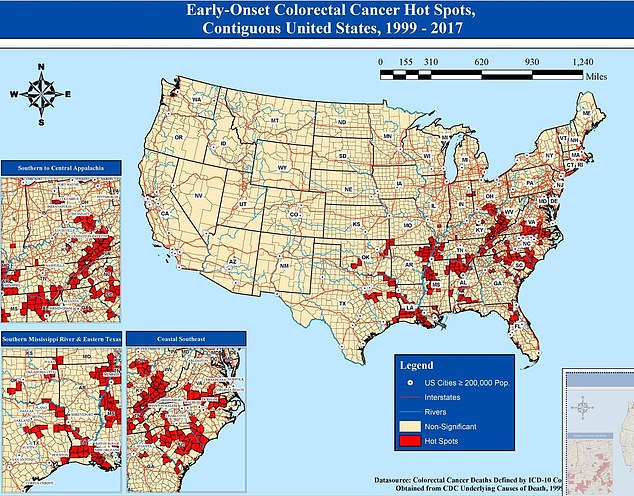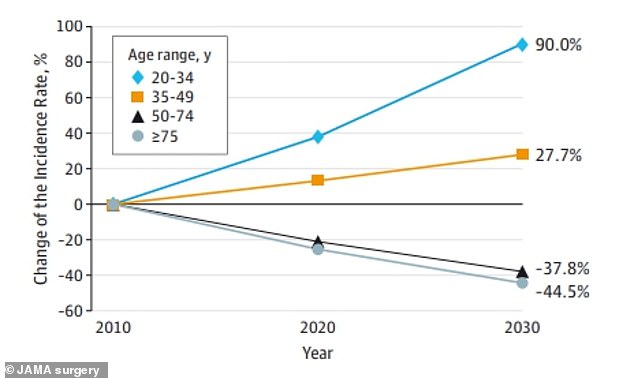…and THESE are the hotspots for the disease
 Scientists have revealed the seven factors that put young men at a higher risk of colon cancer – as experts scramble to find what’s causing a surge in the disease.
Scientists have revealed the seven factors that put young men at a higher risk of colon cancer – as experts scramble to find what’s causing a surge in the disease.
Once seen as a disease of the elderly, there has been a mysterious doubling in colon cancer cases among young adults in recent years.
Researchers from Indiana University analyzed medical records of 3,000 men aged 35 to 49 years old — a fifth of whom were diagnosed with colon cancer.
The study, published recently in the journal Cancer Prevention Research, looked at the electronic health records of men from veteran medical centers and databases.
To determine who was most at risk for early onset colon cancer — when the cancer occurs before the age of 50 — researchers examined the medical records against 67 factors – including diet, smoking status, and whether the men took over-the-counter medications.colorectal cancer_01

The above graphic shows the seven factors scientists say raise the risk of colon cancer in younger men
Among all of the factors, scientists found seven that significantly raised men’s risk.
They were: being an older age (35 to 49 years old); alcohol use; a high insurance copay; having a first- or second-degree relative, such as a parent, sibling or aunt, with colon cancer; having a high disease burden, such as being a smoker; and not regularly using statins or non-steroidal anti-inflammatory drugs (NSAIDs), such as aspirin or ibuprofen.
Dr Thomas Imperiale, a gastroenterologist at the university and lead author on the study said the findings do not suggest all young men start to take NSAIDs or statins regularly because there is a risk of side effects, such as kidney damage.
He told DailyMail.com that most men should instead ‘look at the other five factors to see which might increase their risk’.
Dr Imperiale said: ‘This study is important because it puts whether, and possibly how, to screen people who are younger than 45 years old — below the age for recommended colorectal cancer screening — on the table for consideration of screening.
‘We know that colon cancer at younger ages is on the rise, although the absolute risk is still much lower even in the 45- to 54-year-old age group.
‘Nonetheless, that doesn’t mean that we shouldn’t be trying to identify younger people at higher risk to screen them’.
He added: ‘Clinicians might have a discussion with a patient and say that although screening guidelines don’t kick in until age 45 and you don’t have a family history, you do have some risk factors. Might you consider a noninvasive screening test?’

The above map, published in 2020 in the American Journal of Cancer Research, shows counties with the highest rate of early onset colon cancer in the US between 1999 and 2017 – and they’re mostly concentrated on the east coast and south east
Researchers found that men with a relative with colon cancer were more than twice as likely as their peers to develop the disease.

Data from JAMA Surgery showed colon cancer is expected to rise by 90 percent in people ages 20 to 34 by the year 2030. Doctors are not sure what is driving the mystery rise
Current alcohol use increased the risk 75 percent, and having a high insurance copay increased the likelihood by 61 percent.
 A high disease burden raised the risk by 15 percent, while being slightly older raised the risk by nine percent.
A high disease burden raised the risk by 15 percent, while being slightly older raised the risk by nine percent.
The researchers suggested regularly taking NSAIDs and statins may lower the risk of the cancer because they effect the production of prostaglandins — a hormone involved in inflammation — in cells lining the colon.
Drinking alcohol can raise the risk by causing damage to cells in the colon and change in the gut microbiome.
A high insurance copay is a risk factor because it makes people less likely to seek medical attention, they said.
Colon cancer typically begins as a small growth called a polyp on the inner lining of the colon.
Over time, cells in these polyps begin to grow uncontrollably, leading to the development of colon cancer.
People with colon cancer often don’t show symptoms until later stages — when the disease is more difficult to treat — which is why doctors urge everyone, especially young men, to get screened every decade beginning at 45 years old.
Symptoms of this cancer include rectal bleeding or blood in the stool, losing weight without trying, ongoing abdominal discomfort and a change in bowel habits.
In the 1990s, just 11 percent of colorectal cancer cases were among people younger than 55 years old.
But cases have more than doubled, with people in that age group now accounting for a fifth of all new diagnoses, according to the latest data from 2021.
Amid the spike in early onset colon cancer, researchers in a separate 2020 study found that 232 counties in the US were considered hotspots for the cancer. Ninety-two percent of the hotspots were in the south and eight percent were located in the Midwest.
It wasn’t clear why most hotspots were in the south, but scientists said this could be because of a larger African American population — with the disease disproportionately affecting this group — and higher poverty rates leading to less access to healthcare.
If caught in the early stages, before it spreads to other areas of the body, the charity Fight Colorectal Cancer says nine-in-10 colon cancer patients will live beyond five years from their diagnosis.
But, should the cancer not be detected until stage three — when it has spread to other areas of the body — this drops to 71 percent. At stage four, just 14 percent of patients live for another five years.
Written by Luke Andrews for The Daily Mail ~ August 6, 2023
